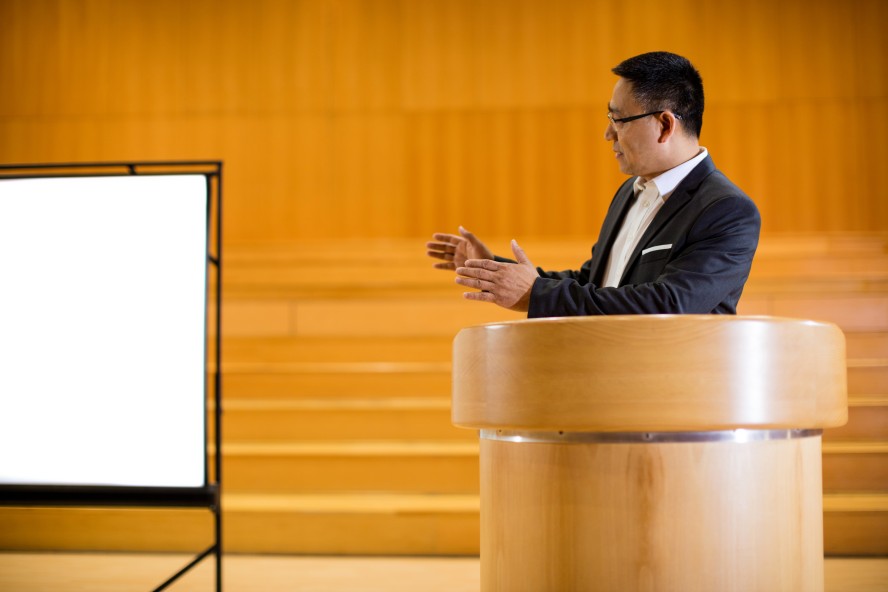
In the world of events, knowing your speaker type is like choosing the right spice for a recipe – it can make or break the experience. In this article, we’ll discuss the significant differences between a keynote speaker and a guest speaker. It’s like comparing apples to oranges – both delicious but with distinct flavors.
So, let’s start as we break down the respective roles of ‘Keynote Speaker vs Guest Speaker,’ explaining why they’re important and how each speaker adds their unique touch to the event stage!
Who is a Keynote Speaker?
A keynote speaker is a seasoned and influential individual chosen to address an audience at an event, conference, or seminar. They are typically experts or thought leaders in their field, selected for their ability to inspire, inform, and engage a diverse audience. The primary purpose of a keynote speaker is to set the overarching theme of the event, leaving a lasting impact on the attendees. You can also check out our Step-by-Step Guide to Becoming a Keynote Speaker.
Qualities of a Good Keynote Speaker
What makes a keynote speaker stand out in a crowd? It’s more than just the microphone and the spotlight. Let’s explore the essential qualities that make a speaker exceptional in the art of delivering impactful keynotes-
- Expertise: A great keynote speaker knows a lot about their topic. Imagine a science expert talking about cool experiments. They’re like the superheroes of what they talk about!
- Relevance: The best keynote speakers ensure what they say matters to you. For example, if you’re into sports, they might share stories about your favorite athletes, making them enjoyable and easy to understand.
- Inspiration: Keynotes are usually prominent figures recognized for their broad expertise or charismatic appeal. A top-notch keynote speaker inspires you to do something great. They share stories that make you believe in yourself.
- Adaptability: Sometimes, things don’t go as planned, and that’s okay. A good keynote speaker can change their talk if needed, just like a teacher who switches things up when the original plan doesn’t work. They’re flexible and can handle surprises smoothly.
Who is a Guest Speaker?
A guest speaker is someone invited to talk at an event, like a special guest. They’re not the main focus of the event but bring their expertise or experiences to share with the audience. They add variety and new perspectives to the event, making it more exciting and informative.
Qualities of a Good Guest Speaker
Events get extra excitement when a guest speaker joins the stage. As an event planner, you should check out these 7 Things to Consider While Writing a Formal Guest Speaker Invitation.

These speakers bring a fresh perspective and valuable insights to the gathering. Let’s explore some important qualities a guest speaker should have-
- Clarity: The best guest speakers explain things in a way that everyone can understand. It’s like having a friend who tells a story without using complicated words. They ensure everyone, from beginners to experts, can follow along easily.
- Engagement: An excellent guest speaker keeps everyone interested. Think of a storyteller who knows just when to add excitement. They use examples and stories to capture attention, making the audience feel involved and connected.
- Relatability: A great guest speaker understands the audience. For instance, if they’re speaking to students, they might share experiences from their school days. This relatability makes the talk feel like a friendly chat, creating a connection with the listeners.
- Respectful Interaction: Good guest speakers appreciate their audience. They encourage questions and discussions like a friend who wants to hear your thoughts. This respectful interaction makes the talk feel like a two-way conversation, creating a positive and engaging atmosphere.
Keynote Speaker vs Guest Speaker – Key Differences
When it comes to events, the roles of a keynote speaker and a guest speaker seem similar, but they bring distinct flavors to the stage. Let’s delve into the significant differences between these two essential contributors to any gathering-
Basis of Difference | Keynote Speaker | Guest Speaker |
Role | Sets the event’s overarching theme and captures the audience’s attention as a primary focus. | Contributes to the event by sharing specific expertise, providing a unique perspective, or offering insights on a particular topic. |
Selection Criteria | Chosen for their prominence, expertise, and ability to inspire and engage a diverse audience. | Invited based on their specific knowledge, experience, or relevance to the event’s theme or purpose. |
Focus of Presentation | Addresses the broader theme of the event, often delivering a keynote address that sets the tone. | Delivers a talk that is more specialized, focusing on a particular subject or area of expertise. |
Duration of Presentation | Typically delivers a longer presentation, often spanning 30 minutes to an hour. | Presents a shorter talk, usually ranging from 15 to 30 minutes, depending on the event format. |
Interaction with Audience | They may have limited interaction, with a more formal and structured presentation. | Encourages audience engagement through Q&A sessions, discussions, or interactive elements, fostering a more participatory atmosphere. |
Overall Impact | Aims to leave a lasting impression on the audience, shaping their perception of the event. | Contributes a valuable perspective or knowledge, adding depth to the event without necessarily defining its overall theme. |
1. Role
The role of a keynote speaker is to feature as the headline speaker at an event. These speakers are often chosen based on their ability to inspire and engage listeners on a broader level, addressing universal themes or industry-wide trends. While their interaction with the audience may be more formal, the aim is to leave a lasting impression and shape the audience’s perception of the entire event.
On the other hand, a guest speaker contributes to an event by sharing specific expertise, offering insights into a particular topic, or providing a unique perspective. Unlike keynote speakers, guest speakers are selected based on their specialized knowledge and relevance to the event’s theme or purpose. Their role is more focused and tailored, allowing them to bring a distinct flavor to the gathering. What sets them apart is their ability to engage the audience through discussions, Q&A sessions, or interactive elements, creating a more participatory atmosphere.
2. Selection Criteria
Most event coordinators also consider the diversity of their speakers. Well-run events typically have a mix of speakers in terms of gender and race to offer a variety of viewpoints on the main subject. A 2020 Professional Convention Management Association (PCMA) research found that 56% of event planners incorporate diversity objectives into the speaker hiring process.
A keynote speaker’s selection criteria are prominence, expertise, and the ability to inspire and engage a diverse audience. Event organizers often seek individuals with a notable presence in their field, be it business, academia, or entertainment. Keynote speakers are expected to bring a level of authority and charisma to the stage, making them captivating figures for the event attendees. The goal is to choose a keynote speaker who possesses deep knowledge and can leave a lasting impression on the audience, setting the stage for a memorable event.
Guest speakers are selected based on specific knowledge, experience, or relevance to the event’s theme or purpose. The emphasis is on their expertise in a particular subject matter rather than their overall prominence. Event organizers may choose guest speakers for their unique perspectives, insights, or achievements in a niche area. The selection process involves evaluating the potential contribution of the guest speaker to the event’s objectives. While prominence is a factor, it takes a backseat to the specific value the guest speaker brings to the targeted subject or theme of the event.
3. Focus of Presentation
The focus of a keynote speaker’s presentation extends to addressing the broader theme of the event. These speakers are tasked with delivering a keynote address that sets the tone, captures the audience’s attention, and establishes the overall narrative for the gathering. Their presentations often touch on universal themes, industry trends, or inspirational messages that resonate with a diverse audience.

In contrast, a Guest Speaker directs their presentation toward a more specialized and specific focus. Their role is to deliver insights, knowledge, or experiences on a particular subject matter relevant to the event. The content is tailored to meet the interests and expectations of the audience interested in that particular aspect, creating a more specialized and in-depth experience.
4. Duration of Presentation
Keynote speakers typically deliver longer presentations. Their talks often span a duration of 30 minutes to an hour, providing ample time for them to articulate their ideas, share anecdotes, and engage the audience. The extended duration allows keynote speakers to build a comprehensive narrative, weaving together various elements to create a memorable and impactful experience for the attendees.
On the other hand, guest speakers present shorter talks, usually ranging from 15 to 30 minutes. The condensed timeframe is tailored to the more specialized nature of their content. Despite the shorter duration, guest speakers aim to deliver concentrated and impactful presentations, focusing on the specific subject matter for which they were invited. The shorter duration also allows event organizers to include multiple guest speakers, offering diverse perspectives within the overall event schedule.
5. Interaction with Audience
The interaction between a keynote speaker and the audience tends to be more formal and structured. While keynote speakers may engage with the audience through techniques like rhetorical questions or occasional audience participation, the primary focus is often on delivering a well-prepared, impactful speech. The level of direct interaction is generally limited compared to other types of speakers. Q&A sessions or discussions may be reserved for specific event segments, providing a more structured format for audience engagement. Keynote speakers, however, aim to connect with the audience emotionally and intellectually, fostering a sense of shared experience.
In contrast, guest speakers often encourage more direct interaction with the audience. They may incorporate elements such as Q&A sessions, open discussions, or interactive activities to engage attendees actively.

The goal is to create a more participatory atmosphere, allowing the audience to interact directly with the guest speaker, ask questions, and share their thoughts. As a speaker, before your next speaking gig, check out these 15 Tips That Guarantee A Productive Q&A Session. This approach fosters a dynamic exchange of ideas, making the session more engaging and responsive to the audience’s specific interests. Guest speakers thrive on direct interaction, creating a more inclusive and collaborative presentation environment.
For more tips on interacting efficiently with the audience, check out 10 Tips to Become a Successful Speaker.
6. Overall Impact
The overall impact of a keynote speaker is profound, aiming to leave a lasting impression on the audience and shape their perception of the entire event. As well-known personalities, their role goes beyond delivering information; it involves inspiring, motivating, and setting a tone that resonates throughout the gathering. The lasting impact extends beyond the duration of their presentation, shaping the event’s narrative and contributing to its overall success.
While guest speakers may not define the event’s theme, their impact is significant within their specific area of expertise. The overall impact lies in the depth and richness they add to the gathering, offering a unique perspective or valuable insights. Their presentations contribute to a more diversified and comprehensive event experience, providing attendees with specialized knowledge or a fresh viewpoint.
If you are a fresher in the speaker community, here’s How to Find Paid Speaking Gigs-13 Sure-Shot Ways!
Role of a Keynote Speaker
A Keynote Speaker’s role is central to an event’s success and ambiance. Let’s see how-
- Setting the Stage
A Keynote speaker is the event’s architect, setting the stage for the entire gathering. They must set the right tone for the event and drive home the main message.
For instance, imagine a technology conference where a renowned industry expert is the keynote speaker. Their address may delve into groundbreaking innovations, shaping the audience’s anticipation for the following tech-centric discussions.
- Inspiration and Motivation
Beyond delivering information, a keynote speaker’s primary role is to inspire and motivate the audience. For example, a business leader sharing anecdotes of overcoming challenges at a corporate event – their stories not only resonate with the audience but also instill a renewed sense of determination and purpose.
- Universal Themes and Industry Trends
Keynote Speakers often touch on universal themes or industry trends relevant to the event. In the context of a sustainability conference, a keynote speaker might explore global environmental challenges, providing insights framing subsequent discussions. Their role involves presenting information in a way that captivates diverse audiences, making complex topics accessible and engaging.
- Formal Interaction with Purpose
While the interaction with the audience may be more formal, the keynote speaker’s address is carefully crafted to foster a connection. Rhetorical questions, thought-provoking statements, and occasional audience participation serve as tools for engagement.
For example, during a keynote address at a leadership conference, the keynote speaker, a seasoned CEO, engages in formal yet purposeful interaction. As they discuss effective leadership strategies, they pose a question to the audience: “What qualities do you believe define a successful leader?” This encourages individuals to reflect on their own perspectives, creating a moment of introspection. This structured interaction ensures that the audience remains attentive and connected to the event’s message.
- Shaping Event Perception:
A keynote speaker significantly influences how attendees perceive the event as a whole. Their role is to leave an indelible mark, creating a memorable experience that extends beyond the duration of their presentation.
Role of a Guest Speaker
A guest speaker brings a special touch to events, like having a friend share exciting stories or teach something interesting. Let’s see how-
- Specialized Expertise
A guest speaker is like a friendly guide who knows a lot about a specific topic. For instance, if the event concerns space exploration, inviting an astronaut as the guest speaker brings firsthand insights and a unique perspective.
- Focused Presentation
Unlike keynote speakers, guest speakers dive deep into a particular subject. Imagine a scientist explaining fascinating details about dinosaurs at a science event – their talk focuses on a specific area, making it both informative and captivating.
- Interactive Engagement
Guest speakers love interaction! They might ask questions, encourage discussions, or even share fun activities. For example, a wildlife photographer at a nature event could ask the audience about their favorite animals, creating a lively and participatory atmosphere.

- Valuable Contribution
Although they don’t set the event’s main theme, guest speakers add valuable insights. For instance, inviting a nutrition expert to a health seminar – their knowledge contributes a special flavor, enriching the event with focused information.
- Personal Connection
Guest speakers often share personal stories, making the audience feel connected. Suppose a successful entrepreneur talks about their journey – it’s like having a friend share experiences, adding a relatable touch to the event.
Key Takeaway
In wrapping up, the difference between a keynote speaker and a guest speaker is like the difference between your event’s headliner (or star) and a supporting cast member (guest speaker).
Keynote speakers set the event’s tone, leaving a lasting impact, while guest speakers bring specialized expertise, making the gathering more diverse and engaging. Both play unique roles, creating a dynamic and enriching experience for everyone involved.
So, the next time you attend an event, you’ll recognize each speaker’s special contributions, making it an even more enjoyable experience! If you’re a new speaker looking for some inspiration, you should check out these 17 Exceptional Speaker Websites. You should also sign up for Eventible’s speaker directory, The Gazebo – B2B Speaker Directory. It’s a community of the most popular speakers as chosen by event attendees worldwide.
Also, to stay updated on all the latest information about the event industry, visit our site- Eventible.




Comments are closed.